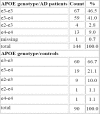Evaluation of APOE Genotype and Vascular Risk Factors As Prognostic and Risk Factors for Alzheimer's Disease and Their Influence On Age of Symptoms Onset
- PMID: 30894904
- PMCID: PMC6420953
- DOI: 10.3889/oamjms.2019.166
Evaluation of APOE Genotype and Vascular Risk Factors As Prognostic and Risk Factors for Alzheimer's Disease and Their Influence On Age of Symptoms Onset
Abstract
Background: Alzheimer's disease (AD), the most common cause of dementia, is evolving to become a threatening epidemy of the 21st century. Only 21% of the predicted number of AD patients in Macedonia have been diagnosed and treated, which means that almost 80% are underdiagnosed or misdiagnosed. Apolipoprotein E gene (APOE) is recognised as the strongest genetic risk factor for sporadic AD. Whether and when Alzheimer's disease develops, depends on the very complex interaction between genetic and modifiable risk factors. It has been known that vascular factors like hypertension, diabetes mellitus, hypercholesterolemia and obesity increase the risk of developing both AD, vascular dementia and mixed AD and vascular pathology.
Aim: This study aims to evaluate the influence of APOEε4 allele presence and modifiable vascular risk factors (hypertension, diabetes mellitus and dyslipidemia) as prognostic and risk factors for AD and their influence on the age of onset of AD symptoms among 144 AD patients from Macedonia.
Material and methods: Study group of a total of 144 patients diagnosed with AD was evaluated. APOE genotyping was performed using APOE haplotype-specific sequence specific-primer (SSP)-PCR (Polymerase Chain Reaction) methodology. The non-standardized questionnaire was used to obtain information about demographics, lifestyle and modifiable risk factors that could influence disease onset and phenotype.
Results: Statistically significant association was found between the presences of APOEε4 allele in AD group versus controls. The presence of APOEε4 allele increases the risk of developing AD in a 3-fold manner. The average age of disease onset in the ε4 carrier group was 67.2 ± 8.3 and in the ε4 non-carrier group 69.7 ± 9.4. This confirms that the presence of APOEε4 allele shifts towards earlier disease onset, though the difference is not statistically significant. Out of the vascular risk factors, only hypertension was significantly associated with earlier AD onset. Out of total 144 patients, in 22.9% the first symptom onset was before the age of 65, that can be considered as early onset Alzheimer's Disease (EOAD), which is much higher than 5% for EOAD as most of the studies report.
Conclusions: The average age of disease onset of 68.4 years could be considered earlier than the average age of AD onset worldwide. Out of all the vascular risk factors analysed in this study, only hypertension and dyslipidemia were found to significantly increase the risk for developing AD and only the presence of hypertension influences the age of onset, shifting towards earlier disease onset. Public awareness campaigns should be organised to influence general population knowledge about Alzheimer's disease, early recognition and the influence of modifiable vascular risk factors.
Keywords: APOEε4 allele; Alzheimer’s disease; dyslipidemia; hypertension.
Figures
Similar articles
-
Multisystem failure, tipping points, and risk of Alzheimer's disease.Alzheimers Dement. 2025 May;21(5):e70249. doi: 10.1002/alz.70249. Alzheimers Dement. 2025. PMID: 40346724 Free PMC article.
-
Cerebrospinal fluid biomarkers for Alzheimer's disease: the role of apolipoprotein E genotype, age, and sex.Neuropsychiatr Dis Treat. 2015 Dec 17;11:3105-10. doi: 10.2147/NDT.S95018. eCollection 2015. Neuropsychiatr Dis Treat. 2015. PMID: 26719695 Free PMC article.
-
Correlation of polymorphism of APOE and LRP genes to cognitive impairment and behavioral and psychological symptoms of dementia in Alzheimer's disease and vascular dementia.Int J Clin Exp Med. 2015 Nov 15;8(11):21679-83. eCollection 2015. Int J Clin Exp Med. 2015. PMID: 26885125 Free PMC article.
-
Genetics of early-onset Alzheimer dementia.ScientificWorldJournal. 2003 Jun 16;3:497-519. doi: 10.1100/tsw.2003.39. ScientificWorldJournal. 2003. PMID: 12847300 Free PMC article. Review.
-
Investigation of the Relationship between Apolipoprotein E Alleles and Serum Lipids in Alzheimer's Disease: A Meta-Analysis.Brain Sci. 2023 Nov 6;13(11):1554. doi: 10.3390/brainsci13111554. Brain Sci. 2023. PMID: 38002514 Free PMC article. Review.
Cited by
-
Cost-effectiveness of using amyloid positron emission tomography in individuals with mild cognitive impairment.Cost Eff Resour Alloc. 2021 Aug 14;19(1):50. doi: 10.1186/s12962-021-00300-9. Cost Eff Resour Alloc. 2021. PMID: 34391439 Free PMC article.
References
-
- Winblad B, et al. Defeating Alzheimer's disease and other dementias:a priority for European science and society. Lancet Neurol. 2016;15(5):455–532. https://doi.org/10.1016/S1474-4422(16)00062-4. - PubMed
-
- Nussbaum RL, Ellis CE. Alzheimer's disease and Parkinson's disease. N Engl J Med. 2003;348(14):1356–64. https://doi.org/10.1056/NEJM2003ra020003 PMid:12672864. - PubMed
-
- Strittmatter WJ, et al. Apolipoprotein E:high-avidity binding to beta-amyloid and increased frequency of type 4 allele in late-onset familial Alzheimer disease. Proc Natl Acad Sci U S A. 1993;90(5):1977–81. https://doi.org/10.1073/pnas.90.5.1977 PMid:8446617 PMCid:PMC46003. - PMC - PubMed
-
- Reinvang I, Espeseth T, Westlye LT. APOE-related biomarker profiles in non-pathological aging and early phases of Alzheimer's disease. Neurosci Biobehav Rev. 2013;37(8):1322–35. https://doi.org/10.1016/j.neubiorev.2013.05.006 PMid:23701948. - PubMed
-
- Bondi MW, Edmonds EC, Salmon DP. Alzheimer's Disease:Past, Present, and Future. J Int Neuropsychol Soc. 2017;23(9-10):818–831. https://doi.org/10.1017/S135561771700100X PMid:29198280 PMCid:PMC5830188. - PMC - PubMed
LinkOut - more resources
Full Text Sources
Research Materials
Miscellaneous


